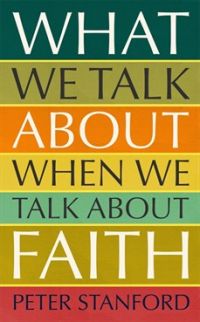Offensive or just awkward, 'faith' gets a bad press. Is it time to change the conversation?
Faith, like politics, has long been a 'no-go' topic for polite conversation, but now more than ever it seems to be a source of toxicity, rancour or just sheer awkwardness in current affairs. Real, relaxed talk about the G-word can be almost impossible to find.
A new book from journalist Peter Stanford is putting faith back on the table, and it does so with a light, insightful and refreshing touch.
Ask the average joe in the US or UK for their assessment of religion today and they might not have much good to say. With dwindling religious affiliation, they're less likely to identify with a faith group, while daily headlines offer only bad news about believers, whether it's violent jihadists, child-abusing priests or right-wing evangelicals seen as loving power more than people.
In such a climate, it's easy to see why faith might get sidelined: many people might still hold it dear, but it's simply too awkward to engage. Add to that, the rhetoric of New Atheists like Richard Dawkins et al has popularised the caricature of religious believers as unthinking or dangerous fools. Speak up about God and you might just get laughed at or ignored.

That makes welcome and timely the release of Peter Stanford's latest book What We Talk About When We Talk About Faith (Hodder & Stoughton, £14.99), a colourful compendium of interviews the journalist has undertaken across his career. His subjects are wide-ranging, including TV's familiar faces like Dermot O'Leary, Delia Smith or Fern Britton, and diverse faith leaders like Desmond Tutu, George Carey or Cardinal Cormac Murphy-O'Connor.
The book helpfully categorises Stanford's guests: 'the ruling class' includes names like Michael Gove, Cherie Blair or Baroness Scotland; 'rebels and reformers' engages polite provocateurs like Karen Armstrong or Bishop Gene Robinson; while 'the outsiders' section greets us with Broken creator Jimmy Govern and rock icon Nick Cave. Then there are nuns, activists, contemplatives and creatives to boot.
Since it is so mixed, we're offered an escape from the echo chambers of social media: there are the devout and the doubting, conservatives and liberals, men and women, and a strong mix of ethnic, social and religious backgrounds.
Helpfully though, Stanford presents it all with a light touch. The interviews are relatively short and easily accessible in the author's winsome tone. Those hoping for Paxman-style interrogations of faith celebrities will probably be disappointed. As Stanford himself warns, he is no 'demon interviewer' looking to assassinate his guests in pursuit of the truth, but rather hopes to 'show what a dizzying variety of subjects can be covered when two people get together to talk about their faith'.
In that he succeeds, and it seems obvious to say that the church especially could use a break from adversarial argumentation. That isn't to say there's no controversy engaged here, but the gentler framing implores us to assume a little more good will to figures we might not align with, to reconsider alternate perspectives.

The book's relative lightness might leave some yearning for extended theological explorations or more in-depth biographies (to which the author of Martin Luther is no stranger). But if that's a loss, then what's gained is diversity and welcome fresh air.
It addresses the deepest questions of human existence and for good or ill continues to influence every level of society: it seems strange that 'faith' is a topic we'd awkwardly ignore. Stanford here is boldly putting it back on the table. The religious who read it can find encouragement as well as the challenge of new perspectives; while those wary of 'faith' might be surprised and engaged by the reality of what that means for so many today.
What We Talk About When We Talk About Faith is on sale in print and E-Book form now.
You can follow @JosephHartropp on Twitter











